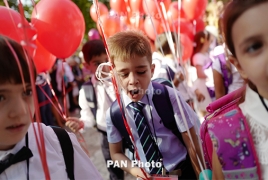Singapore named world leader in terms of science, maths teaching December 7, 2016 - 10:27 AMT PanARMENIAN.Net - Asian countries dominated the top places in a key survey released Tuesday, December 6 of high-school skills, but the report criticised science teaching in many countries, AFP reports. The PISA survey of 15-year-olds in 72 countries and economies found that the quality of science lessons was more important than equipment or even staffing levels. And it confirmed earlier findings that loading students down with homework or extra tuition was rarely the key to success in science. Singapore came top of the table for its teaching of science, reading and mathematics. Its students scored an average of 556 points, compared with the average among Organisation for Economic Co-operation and Development (OECD) countries of 493. Where once Finland led the way in educational excellence, Singapore is now the example to other countries, the report said. "Singapore is a standout performer," said OECD Secretary-General Angel Gurria at the global launch of the report in London. "In Singapore, one in five students master the most advanced scientific problems and demonstrate that they think like scientists." Nearly a quarter of all students in Singapore (24 percent) scored in the top two categories in science tests, compared with just eight percent across the OECD countries. The five top-performing countries in the PISA tests, which were carried out in 2015, were Singapore, Japan, Estonia, Taiwan and Finland. However the report found that only 12 countries assessed had improved their performance in science since 2006, despite an increase in spending per primary and secondary student of 20 percent over the same period. "A decade of scientific breakthroughs has failed to translate into breakthroughs in science performance in schools," said Gurria, adding that science education "isn't keeping up" with the "lightning speed" of scientific progress. Around six percent of students in OECD countries, many of them in Europe, reported they did not get regular science lessons. These students scored significantly lower in the tests. Schools that did not offer dedicated science lessons tend to be in poorer areas of countries, the report noted. The problem was particularly bad in Austria, Belgium, Croatia, France, Germany, Slovakia and Taiwan. As a result of floods in Armenia’s northern Lori and Tavush provinces, 17 bridges, including five large ones, have collapsed. David Vardanyan is the son of former Karabakh leader Ruben Vardanyan who who is currently imprisoned in Azerbaijan. Prime Minister Nikol Pashinyan has met with Stephan Schütz, Executive Partner at Gerkan, Marg and Partners. The number of state universities will be reduced from 23 to 8 by 2030, Minister of Education, Science, Culture and Sport Zhanna Andreasyan has said. Partner news |